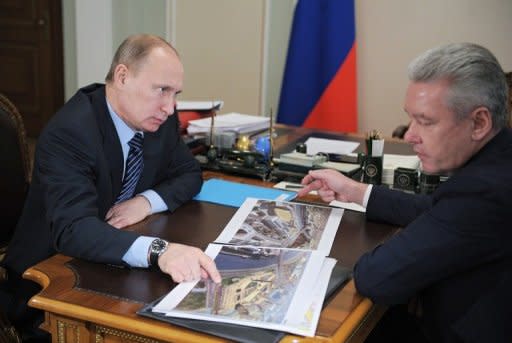Putin slams ultra-nationalists after protests
Prime Minister Vladimir Putin cautioned Monday against attempts to stir up ethnic discord and warned that he was ready to ban nationalist parties as he stepped up his Russian presidential campaign. But in a far-ranging article published on his campaign website, Putin also said that he planned to toughen up immigration legislation, saying those who wanted to work in Russia would have to pass basic tests. "I am deeply convinced that attempts to preach ideas about building a Russian 'national,' mono-ethnic state contradict our entire millenium-long history," wrote Putin. "If a multi-ethnic society is hit by a bacteria of nationalism it loses its strength and durability. Connivance with attempts to foment ethnic strife and hatred towards people of another culture or faith can trigger far-reaching consequences." Putin, who is seeking to win back his old Kremlin job in a presidential election on March 4, is struggling with the worst legitimacy crisis of his 12-year rule. Tens of thousands took to the streets last month in a wave of protest unseen since the early 1990s. Nationalist movements of all hues have joined the nascent protest movement, and many have openly called for a withdrawal from the unrest-infested North Caucasus where Russia has fought two bloody wars against Chechen separatists in the past 20 years. Putin slammed attempts to inflame nationalist sentiments, saying the Russian people throughout centuries served as the backbone of Russia's multi-ethnic, multi-confessional state. "The Russians' great mission is to unite, bind together a civilisation," he wrote punctuating his article with citations from 19th-century philosopher Ivan Ilyin and his contemporary, historian Vasily Klyuchevsky and even the chronicles of the ancient Rus. "We've lived together for centuries. And we will live together in the future. And to those who want or are trying to divide us, I can say just one thing -- keep waiting," he said in the piece also published in the broadsheet newspaper Nezavisimaya Gazeta. Many observers have warned that Russia would plunge into chaos if nationalist forces came to power, and some have accused Alexei Navalny, a 35-year-old anti-Kremlin blogger and the protest movement's arguably most charismatic leader, of openly flirting with ultra-nationalism. Navalny has denied the accusations. However in the same piece, Putin said the country would further toughen up immigration legislation, and migrants who want to work in Russia would from next year have to pass exams on the Russian language, history, literature and law. Travel within the country should also be monitored more thoroughly, he said, proposing that Russian nationals who violate rules of internal migration or fail to register with authorities on arrival to a different region in a timely fashion, face stiff penalties including criminal charges. The strongman prime minister also said nationalist-leaning parties in the country's various ethnic regions would be banned despite a recent drive to simplify legislation for political parties. "We of course should develop our democratic, multi-party system," he said. "But we can't allow one thing -- opportunities to create regional parties including in the national republics. "This is a direct path to separatism," he said, warning that the same fate would await regional governors seeking to play the ethnic card. Alexander Verkhovsky, director of Sova non-governmental organisation that tracks racist violence, dismissed Putin's piece as pre-election populist rhetoric. "Reasonable words next to unreasonable measures," he added, referring to the proposals on migration.




